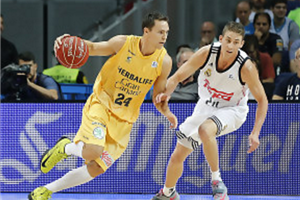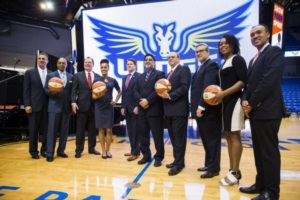
What Club Africain’s loss means for Tunisian basketball
SHEFFIELD (Julio Chitunda’s African Message) - Tunisian champions Club Africain (AC) missed out qualification for this year’s African Champions Cup (ACC) following a 70-69 defeat to FAR Rabat of Morocco over the weekend, and the result could have ramifications to the national team.
Although Tunisia finished third at AfroBasket 2015, and as a result secured one of the three places for African teams for the 18-team 2016 FIBA Olympic Qualifying Tournament (OQT), they need to keep competing internationally.
Therefore, for a national team which is mostly made up of home-based players, competing at ACC - FIBA Africa’s solo club competition - could have filled the gap of international competition.
Triplé historique du @Club_Africain #championnat #coupe #supercoupe #tunisie #basketball pic.twitter.com/4ExWZCRSvR
— Africa Champions Cup (@FIBAACC) January 12, 2015
But, against the odds, star-studded Club Africain fell short to outsiders FAR Rabat in Africa Zone 1 qualifier, and, inevitably, questions keep coming about the potential of Tunisian clubs in international stage.
Although Tunisian side Etoile Sportive Rades won Africa Zone 1 qualifier and secured qualification for the upcoming ACC, CA’s loss seems more damaging because of the large number of the national team members on its roster.
It’s been four years since Tunisian side Etoile Sportive du Sahel last won the ACC. Since, then, nothing seems to work out for Tunisian clubs in the competition.
Last year, Etoile Sportive Rades finished runners-up after losing to Recreativo do Libolo in the final.
Back in 2013, Etoile Sportive du Sahel fell short in the final to eventual champions Primeiro D’Agosto of Angola.
Etoile Sportive du Sahel and Primeiro de Agosto on road to title #sousse2013 #championscupformen @basketball pic.twitter.com/rBIEUREvhT
— Africa Champions Cup (@FIBAACC) December 21, 2013
A year earlier, Sahel claimed a sixth-place finish in the ACC held in Malabo, Equatorial Guinea.
Obviously, with continuing modest achievements at club levels, the national team inevitably pays the price.
At AfroBasket 2015, Tunisia were among the lowest scoring teams, averaging 69 points per games.
Last month, Tunisia head coach Adel Tlatli admitted to FIBA.com that they were not favourites for the upcoming OQT because they lack a stronger and more competitive national league.
"As a team we lacked bench rotation also," he said of his team performances at the African Championship.
"We had only seven key players, that is not good enough,” he said at the time.
Unless CA receives a wild card invitation to participate in this year’s ACC things start to become alarming for Tunisia as seven out twelve players - Mourad El Mabrouk, Mokhatar Ghyaza, Nizar Knioua, Mohamed Hadidane, Zied Channufi, Lassaad Chouaya and Youssef Mejri - have represented Tunisia at some point, and may be options for Tlatli for the OQT.
From three participating teams at ACC 2014, Tunisia could be represented at ACC 2015 by ES Rades, while rivals Angola count with three clubs (Primeiro d'Agosto, Petro de Luanda and ACC reigning champions Recreativo do Libolo).
Still, Tunisia's Amin Rzig, who played a crucial for the ES Rades last week, said: “Surely we are going to Angola to play for the title. We have good team.”
As the vast majority of Tunisian international play professional basketball in the country - with the exception of Dallas Mavericks center Salah Mejri and Makram Ben Romdhane who last played for Egypt club Sporting Alexandria - ACC matters for them as every ambitious African team look to take part in the competition.
Tournoi D'Abu Dhabi : @clubafricain 98 - 71 @ALNasrSC #Day2 pic.twitter.com/7Su3lieP4I
— Africa Champions Cup (@FIBAACC) November 28, 2014
As the core of the national team, Club Africain's loss in the qualifier suggests Tunisia need to regroup to avoid losing ground to continental contenders.
Julio Chitunda
FIBA
FIBA's columnists write on a wide range of topics relating to basketball that are of interest to them. The opinions they express are their own and in no way reflect those of FIBA.
FIBA takes no responsibility and gives no guarantees, warranties or representations, implied or otherwise, for the content or accuracy of the content and opinion expressed in the above article.

















